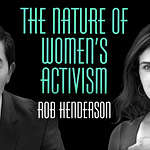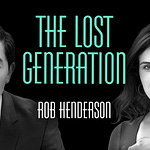William Costello is a rising star in the field of evolutionary psychology, and one of the few scholars seriously studying incel communities. He is a PhD student at the University of Texas at Austin, where he is a member of Dr. David Buss' Evolutionary Psychology lab.
Today William and I spoke about incels, male adolescence, and what’s actually going on with disaffected young men today. His research is truly fascinating. I strongly recommend following William on Twitter/X here.
Some topics we covered:
Fascinating findings from William Costello’s research:
73% of incels meet the criteria for moderate or severe depression vs. 33% of non-incels
67% of incels were severely or moderately anxious vs. 38% of non-incels
His research suggests that about one-third of incels qualify for an autism diagnosis
More than 50% have had suicidal thoughts in the past two weeks
One of the biggest myths is that incels are white, right-wing extremists. In fact, 42% of incels are ethnic minorities.
Politically, incels lean center-left on average which complicates the usual narrative. We both agreed that incels aren’t a political movement. They don’t have a coherent ideology—just a shared despair around sex, status, and rejection.
Netflix’s Adolescence—a gripping miniseries about a troubled teenage boy—and broke down what the show gets right (and wrong) about modern teenage masculinity.
William points out a fascinating dynamic: boys in the show behave very differently toward male versus female authority figures—and it lines up with what we see in real life.
I reflect on my visit to the Michaela School in London, which stands in stark contrast to the chaos we see in Adolescence.
The show references Andrew Tate as a toxic influence on young males. We ask whether a character like Jamie—the boy at the center of Adolescence—would behave the same way in a world without Andrew Tate.
William makes the case that the mainstream media’s tendency to lump incels, red-pillers, and Andrew Tate into a single bucket misses important distinctions—and leads to real confusion among adults.
I compare the Andrew Tate phenomenon to the way 50 Cent and Eminem were received in the early 2000s—adults panicking, kids idolizing.
We dig into the psychological power of humiliation and how it fuels status-seeking violence in young men.
William explained why “incel” isn’t just a description of being involuntary celibate—it’s an identity built around fatalism, resentment, and a belief in the dominance of looks in the dating market.
I found William’s theory compelling—that incel ideology might be an unconscious strategy to manipulate the mating market: convince rivals to give up, lower women’s self-esteem, and improve one’s mating prospects.
William explained why many incels may not be high in the Dark Triad traits like psychopathy or narcissism—but score very high on something else: interpersonal victimhood; a tendency to ruminate on slights, demand validation of your suffering, and believe you’re morally superior because you’ve been wronged
We talked about how video games can hijack male status drives—offering rewards and goals without the discomfort of real-life struggle or rejection.
William brought up the “ick” factor—how women often see video games as antisocial or juvenile, especially when it feels like their partner is disappearing into a screen.
We discussed how VR and sex robots might be the next evolutionary mismatch—supernormal stimuli that hijack male mating psychology.
Even when sex is available—via escort, OnlyFans, or robot girlfriend—it’s not satisfying. What most men, most people, actually want is to feel desired.
William mentioned a German study where 9% of men reported using sex dolls—a surprisingly high number, considering their cost and stigma.
Much more in this wide-ranging conversation. Let me know what you thought of this discussion in the comments.












